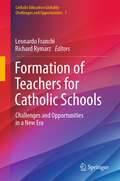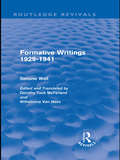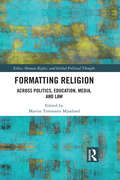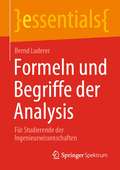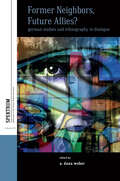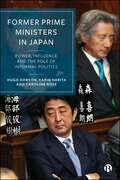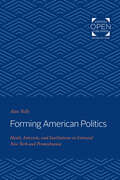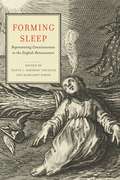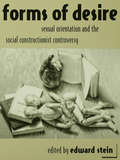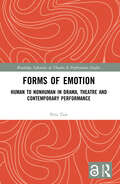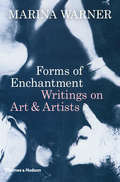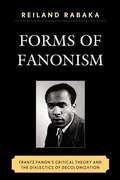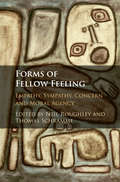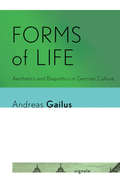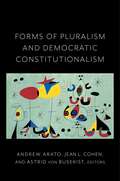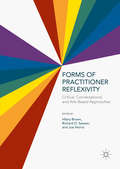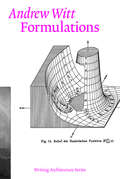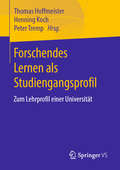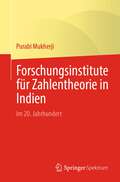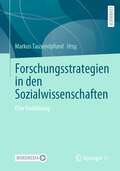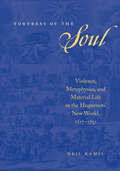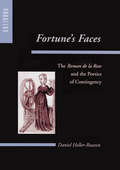- Table View
- List View
Formation of Teachers for Catholic Schools: Challenges and Opportunities in a New Era (Catholic Education Globally: Challenges and Opportunities #1)
by Richard Rymarz Leonardo FranchiThis book explores in a theoretical and practical sense the challenges and opportunities arising in the initial and ongoing formation processes for teachers in Catholic schools. It showcases a range of international perspectives on how prospective teachers for Catholic schools are prepared both academically and pastorally for their professional role. Divided into two parts, Part 1 of the book focuses on certain countries in the Anglosphere; each country with a dedicated chapter in which the academic and pastoral approaches to teacher formation are examined in the context of its particular cultural, political and religious landscape. Part 2 of the book examines specific areas of interest with particular reference to what it means for the Catholic Church’s mission to offer suitable formation to its corps of teachers. Building on the editors' previous work, this book offers a fresh perspective on this subject by bringing together observations from selected local contexts on what Catholic teacher formation looks like as a set of organised processed and structures. It also shows how the study of educational themes offers challenges to current practices, but also opportunities for fruitful engagement with other educational perspectives.
Formative Writings (Routledge Revivals)
by Simone WeilThis volume, first published in English in 1987 makes available an important part of Weil’s early writings. Although primarily known as a religious thinker, she devoted enormous energy in her formative years to her work as a political activist and as a philosopher/teacher. This book reveals these other sides of Weil and demonstrates the lines of continuity underlying her whole thought. Written between 1929 and 1941 the book covers a crucial and transitional period in Weil’s life. Taken together they represent invaluable primary source material on the evolution of Weil’s life and on her chosen method of abstracting elements from her personal experience and transmuting that experience into considered thought. Even when highly theoretical, her writing was always concerned with the application of her intelligence to concrete problems of human existence.
Formatting Religion: Across Politics, Education, Media, and Law (Ethics, Human Rights and Global Political Thought)
by Marius Timmann MjaalandTo talk about religion is to talk about politics, identity, terrorism, migration, gender, and a host of other aspects of society. This volume examines and engages with larger debates around religion and proposes a new approach that moves beyond the usual binaries to analyse its role in our societies at large. Formatting Religion delves into these complexities and demonstrates the topical need for better understanding of how religion, society, culture, and law interact and are mutually influenced in periods of transition. It examines how over the last two decades, people and institutions have been grappling with the role of religion in socio-cultural and political conflicts worldwide. Drawing on a host of disciplines – including sociology, philosophy, anthropology, politics, media, law, and theology – the essays in this book analyse how religion is formatted today, and how religion continuously formats society, from above and from below. The volume will be of great interest to scholars and researchers of religious studies, politics, media and culture studies, and sociology.
Formeln und Begriffe der Analysis: Für Studierende der Ingenieurwissenschaften (essentials)
by Bernd LudererDie wichtigsten mathematischen Formeln und Begriffe aus dem Gebiet Analysis für Studierende der Ingenieurwissenschaften und verwandter Richtungen werden präsentiert. Dieses essential ist nützlich als Ergänzung zum Studium, beim Selbststudium, als Nachschlagewerk zum täglichen Gebrauch und in der Klausur. Enthalten ist in übersichtlicher Weise alles Wichtige zu komplexen Zahlen, Definition und Eigenschaften zahlreicher Funktionen, Differenzial- und Integralrechnung, einschließlich Doppel- und Dreifachintegrale, sowie gewöhnlichen Differenzialgleichungen.
Former Neighbors, Future Allies?: German Studies and Ethnography in Dialogue (Spektrum: Publications of the German Studies Association #28)
by Dana WeberGerman studies scholars from various disciplines often use and reference ethnography, yet do not often present ethnography as a core methodology and research approach. Former Neighbors, Future Allies? emphasizes how German studies engages in methods and theories of ethnography. Through a variety of topics and from multiple perspectives including literature, folklore, history, sociology, and anthropology, this volume draws attention to how ethnography bridges transdisciplinary and international research in German studies.
Former Prime Ministers in Japan: Power, Influence and the Role of Informal Politics
by Caroline Rose Hugo Dobson Karin NaritaAvailable open access digitally under CC-BY-NC-ND licence. Despite growing international interest in the position and power of the Japanese prime minister, there is little existing research on what happens after these figures leave office. Examining both pre-war and post-war Japan, this book investigates what Japanese prime ministers have done after stepping down and what influence they have continued to exert. Based on research in English and Japanese including biographies, memoirs and interviews, the book examines the specific activities former prime ministers engage in, assessing their motivations and the effect of informal politics in Japan on their successes and failures. Ultimately, the book answers the simple but often unanswered question of ‘where are they now’ and writes the unwritten post-resignation biographies of Japan’s prime ministers.
Forming American Politics: Ideals, Interests, and Institutions in Colonial New York and Pennsylvania
by Alan TullyOriginally published in 1994. In this pathbreaking book Alan Tully offers an unprecedented comparative study of colonial political life and a rethinking of the foundations of American political culture. Tully chooses for his comparison the two colonies that arguably had the most profound impact on American political history—New York and Pennsylvania, the rich and varied colonies at the geographical and ideological center of British colonial America.Fundamental to the book is Tully's argument that out of Anglo-American influences and the cumulative character of each colonial experience, New York and Pennsylvania developed their own distinctive but complementary characteristics. In making this case Tully enters—from a new perspective—the prominent argument between the "classical republican" and "liberal" views of early American public thought. He contends that the radical Whig element of classical republicanism was far less influential than historians have believed and that the political experience of New York and Pennsylvania led to their role as innovators of liberal political concepts and discourse. In a conclusion that pursues his insights into the revolutionary and early republican years, Tully underlines a paradox in American political development: not only were the pathbreaking liberal politicians of New York and Pennsylvania the least inclined towards revolutionary fervor, but their political language and concepts—integral to an emerging liberal democratic order—were rooted in oligarchical political practice."A momentous contribution to the burgeoning literature on the middle Atlantic region, and to the vexed question of whether it constitutes a coherent cultural configuration. Tully argues persuasively that it does, and his arguments will have to be reckoned with like few that have gone before, even as he develops an array of differences between the two colonies more subtle and penetrating than any of his predecessors has ever put forth."—Michael Zuckerman, University of Pennsylvania.
Forming Sleep: Representing Consciousness in the English Renaissance (Cultural Inquiries in English Literature, 1400–1700 #2)
by Nancy L. Simpson-Younger Margaret SimonForming Sleep asks how biocultural and literary dynamics act together to shape conceptions of sleep states in the early modern period. Engaging with poetry, drama, and prose largely written in English between 1580 and 1670, the essays in this collection highlight period discussions about how seemingly insentient states might actually enable self-formation.Looking at literary representations of sleep through formalism, biopolitics, Marxist theory, trauma theory, and affect theory, this volume envisions sleep states as a means of defining the human condition, both literally and metaphorically. The contributors examine a range of archival sources—including texts in early modern faculty psychology, printed and manuscript medical treatises and physicians’ notes, and printed ephemera on pathological sleep—through the lenses of both classical and contemporary philosophy. Essays apply these frameworks to genres such as drama, secular lyric, prose treatise, epic, and religious verse. Taken together, these essays demonstrate how early modern depictions of sleep shape, and are shaped by, the philosophical, medical, political, and, above all, formal discourses through which they are articulated. With this in mind, the question of form merges considerations of the physical and the poetic with the spiritual and the secular, highlighting the pervasiveness of sleep states as a means by which to reflect on the human condition. In addition to the editors, the contributors to this volume include Brian Chalk, Jennifer Lewin, Cassie Miura, Benjamin Parris, Giulio Pertile, N. Amos Rothschild, Garret A. Sullivan Jr., and Timothy A. Turner.
Forming Sleep: Representing Consciousness in the English Renaissance (Cultural Inquiries in English Literature, 1400–1700)
by Nancy L. Simpson-Younger Margaret SimonForming Sleep asks how biocultural and literary dynamics act together to shape conceptions of sleep states in the early modern period. Engaging with poetry, drama, and prose largely written in English between 1580 and 1670, the essays in this collection highlight period discussions about how seemingly insentient states might actually enable self-formation.Looking at literary representations of sleep through formalism, biopolitics, Marxist theory, trauma theory, and affect theory, this volume envisions sleep states as a means of defining the human condition, both literally and metaphorically. The contributors examine a range of archival sources—including texts in early modern faculty psychology, printed and manuscript medical treatises and physicians’ notes, and printed ephemera on pathological sleep—through the lenses of both classical and contemporary philosophy. Essays apply these frameworks to genres such as drama, secular lyric, prose treatise, epic, and religious verse. Taken together, these essays demonstrate how early modern depictions of sleep shape, and are shaped by, the philosophical, medical, political, and, above all, formal discourses through which they are articulated. With this in mind, the question of form merges considerations of the physical and the poetic with the spiritual and the secular, highlighting the pervasiveness of sleep states as a means by which to reflect on the human condition. In addition to the editors, the contributors to this volume include Brian Chalk, Jennifer Lewin, Cassie Miura, Benjamin Parris, Giulio Pertile, N. Amos Rothschild, Garret A. Sullivan Jr., and Timothy A. Turner.
Forms of Desire: Sexual Orientation and the Social Constructionist Controversy
by Edward SteinPerhaps the foremost issue in the emerging area of inquiry known as lesbian and gay studies is the social constructionist controversy. Social constructionism is the view that the categories of sexual orientation are cultural constructs rather than naturally universal categories. Forms of Desire brings together important essays by social constructionists and their critics, representing several disciplines and approaches to this debate about the history and science of sexuality.
Forms of Emotion: Human to Nonhuman in Drama, Theatre and Contemporary Performance (Routledge Advances in Theatre & Performance Studies)
by Peta TaitForms of Emotion analyses how drama, theatre and contemporary performance present emotion and its human and nonhuman diversity. This book explores the emotions, emotional feelings, mood, and affect, which make up a spectrum of ‘emotion’, to illuminate theatrical knowledge and practice and reflect the distinctions and debates in philosophy, neuroscience, psychology, and other disciplines. This study asserts that specific forms of emotion are intentionally unified in drama, theatre, and performance to convey meaning, counteract separation and subversively champion emotional freedom. The book progressively shows that the dramatic and theatrical representation of the nonhuman reveals how human dominance is offset by emotional connection with birds, animals, and the natural environment. This book will be of great interest to students and researchers interested in the emotions and affect in dramatic literature, theatre studies, performance studies, psychology, and philosophy as well as artists working with emotionally expressive performance.
Forms of Enchantment: Writings On Art And Artists
by Marina WarnerAn anthology of enlightening writing by an award-winning critic that engages with art in its social, political, and aesthetic contexts. Art writing at its most useful should share the dynamism, fluidity, and passions of the objects of its enquiry, argues author Marina Warner in this new anthology. Here, some of Warner’s most compelling writing captures the visual experience of the work of a diverse group of artists—with a notable focus on the inner lives of women—through an exploration of the range of stories and symbols to which they allude in their work. Warner vividly describes this imagery, covering the connection with animals in the work of Louise Bourgeois, the Catholicism of Damien Hirst, performance as a medium of memory in the installations of Joan Jonas, and more. Rather than drawing on connoisseurship, Warner’s approach grows principally out of anthropology and mythology. Accompanied by illustrations of the works being described, Marina Warner’s writing unites the imagination of artist, writer, and reader, creating a reading experience that parallels the intrinsic pleasure of looking at art. This book will appeal to any student of art history, those interested in philosophy, feminism, and more generally in the humanities.
Forms of Fanonism: Frantz Fanon's Critical Theory and the Dialectics of Decolonization
by Reiland RabakaThis book, solemnly keeps with Fanon's own predilection for connecting critical theory to revolutionary praxis by utilizing his thought and texts as paradigms and points of departure to deepen and develop the Africana tradition of critical theory.
Forms of Fellow Feeling
by Neil Roughley Thomas SchrammeWhat is the basis of our capacity to act morally? This is a question that has been discussed for millennia, with philosophical debate typically distinguishing two sources of morality: reason and sentiment. This collection aims to shed light on whether the human capacity to feel for others really is central for morality and, if so, in what way. To tackle these questions, the authors discuss how fellow feeling is to be understood: its structure, content and empirical conditions. Also discussed are the exact roles that relevant psychological features - specifically: empathy, sympathy and concern - may play within morality. The collection is unique in bringing together the key participants in the various discussions of the relation of fellow feeling to moral norms, moral concepts and moral agency. By integrating conceptually sophisticated and empirically informed perspectives, Forms of Fellow Feeling will appeal to readers from philosophy, psychology, sociology and cultural studies.
Forms of Life: Aesthetics and Biopolitics in German Culture (Signale: Modern German Letters, Cultures, and Thought)
by Andreas GailusIn Forms of Life, Andreas Gailus argues that the neglect of aesthetics in most contemporary theories of biopolitics has resulted in an overly restricted conception of life. He insists we need a more flexible notion of life: one attuned to the interplay and conflict between its many dimensions and forms. Forms of Life develops such a notion through the meticulous study of works by Kant, Goethe, Kleist, Nietzsche, Wittgenstein, Benn, Musil, and others. Gailus shows that the modern conception of "life" as a generative, organizing force internal to living beings emerged in the last decades of the eighteenth century in biological thought. At the core of this vitalist strand of thought, Gailus maintains, lies a persistent emphasis on the dynamics of formation and deformation, and thus on an intrinsically aesthetic dimension of life. Forms of Life brings this older discourse into critical conversation with contemporary discussions of biopolitics and vitalism, while also developing a rich conception of life that highlights, rather than suppresses, its protean character. Gailus demonstrates that life unfolds in the open-ended interweaving of the myriad forms and modalities of biological, ethical, political, psychical, aesthetic, and biographical systems.
Forms of Pluralism and Democratic Constitutionalism (Religion, Culture And Public Life Ser. #3)
by Christophe Jaffrelot Nadia Urbinati Alfred Stepan Yüksel Sezgin Frederick Cooper Patrick Macklem Courtney Jung Emmanuelle Saada Katharina Pistor Gary Wilder Joshua Simon Tsilly Dagan Rob Howse Michael Karayanni Jeff MileyThe achievements of the democratic constitutional order have long been associated with the sovereign nation-state. Civic nationalist assumptions hold that social solidarity and social plurality are compatible, offering a path to guarantees of individual rights, social justice, and tolerance for minority voices. Yet today, challenges to the liberal-democratic sovereign nation-state are proliferating on all levels, from multinational corporations and international institutions to populist nationalisms and revanchist ethnic and religious movements. Many critics see the nation-state itself as a tool of racial and economic exclusion and repression. What other options are available for managing pluralism, fostering self-government, furthering social justice, and defending equality?In this interdisciplinary volume, a group of prominent international scholars considers alternative political formations to the nation-state and their ability to preserve and expand the achievements of democratic constitutionalism in the twenty-first century. The book considers four different principles of organization—federation, subsidiarity, status group legal pluralism, and transnational corporate autonomy—contrasts them with the unitary and centralized nation-state, and inquires into their capacity to deal with deep societal differences. In essays that examine empire, indigenous struggles, corporate institutions, forms of federalism, and the complexities of political secularism, anthropologists, historians, legal scholars, political scientists, and sociologists remind us that the sovereign nation-state is not inevitable and that multinational and federal states need not privilege a particular group. Forms of Pluralism and Democratic Constitutionalism helps us answer the crucial question of whether any of the alternatives might be better suited to core democratic principles.
Forms of Practitioner Reflexivity
by Hilary Brown Joe Norris Richard D. SawyerThis edited volume addresses the different methods professionals use to promote a critical reflective and reflexive stance among practitioners, leading to both a reconceptualization of practice and its subsequent change. The goal of increased reflection in professional education is intended to expand approaches for professionals to work with diverse others. It is also intended to increase their levels of cognitive differentiation and depth of professional consciousness about themselves alongside diverse others in a rapidly changing world. This is an important issue in a range of applied professional programs, from education to medicine, social work to psychology, business to criminal justice, in nearly every country in the world.
Forms of Thought
by E. J. LoweForms of thought are involved whenever we name, describe, or identify things, and whenever we distinguish between what is, might be, or must be the case. It appears to be a distinctive feature of human thought that we can have modal thoughts, about what might be possible or necessary, and conditional thoughts, about what would or might be the case if something else were the case. Even the simplest thoughts are structured like sentences, containing referential and predicative elements, and studying these structures is the main task of philosophical logic. This clear and accessible book investigates the forms of thought, drawing out and focusing on the central logical notions of reference, predication, identity, modality and conditionality. It will be useful to students and other interested readers in epistemology and metaphysics, philosophy of mind and language, and philosophical logic.
Formulations: Architecture, Mathematics, Culture (Writing Architecture)
by Andrew WittAn investigation of mathematics as it was drawn, encoded, imagined, and interpreted by architects on the eve of digitization in the mid-twentieth century.In Formulations, Andrew Witt examines the visual, methodological, and cultural intersections between architecture and mathematics. The linkages Witt explores involve not the mystic transcendence of numbers invoked throughout architectural history, but rather architecture&’s encounters with a range of calculational systems—techniques that architects inventively retooled for design. Witt offers a catalog of mid-twentieth-century practices of mathematical drawing and calculation in design that preceded and anticipated digitization as well as an account of the formal compendia that became a cultural currency shared between modern mathematicians and modern architects. Witt presents a series of extensively illustrated &“biographies of method&”—episodes that chart the myriad ways in which mathematics, particularly the mathematical notion of modeling and drawing, was spliced into the creative practice of design. These include early drawing machines that mechanized curvature; the incorporation of geometric maquettes—&“theorems made flesh&”—into the toolbox of design; the virtualization of buildings and landscapes through surveyed triangulation and photogrammetry; formal and functional topology; stereoscopic drawing; the economic implications of cubic matrices; and a strange synthesis of the technological, mineral, and biological: crystallographic design. Trained in both architecture and mathematics, Witt uses mathematics as a lens through which to understand the relationship between architecture and a much broader set of sciences and visual techniques. Through an intercultural exchange with other disciplines, he argues, architecture adapted not only the shapes and surfaces of mathematics but also its values and epistemic ideals.
Forschendes Lernen als Studiengangsprofil: Zum Lehrprofil einer Universität
by Henning Koch Peter Tremp Thomas Hoffmeister„Universität des Forschenden Lernens“: Mit diesem Anspruch hat die Universität Bremen in den letzten Jahren ihre Lehrangebote und damit ihr Lehrprofil weiterentwickelt. Die Publikation präsentiert anregende Beispiele und konkretisierende Hinweise zur Umsetzung dieses Postulats. Erörtert werden Modelle und Konzeptionen des Forschenden Lernens als Studiengangsprofil, diskutiert werden Möglichkeiten der Übertragbarkeit. Die Publikation leistet damit einen praxisorientierten Beitrag zur Curriculumentwicklung an Hochschulen und nimmt Fragen auf, die sich an allen Hochschulen mit grosser Dringlichkeit stellen.
Forschungsinstitute für Zahlentheorie in Indien: Im 20. Jahrhundert
by Purabi MukherjiDieses Buch versucht, die schrittweise Entwicklung der wichtigsten Forschungsinstitute zur Zahlentheorie in Südindien, Punjab, Mumbai, Bengalen und Bihar zu beschreiben, einschließlich der Gründung des Tata Institute of Fundamental Research (TIFR) in Mumbai, einem bahnbrechenden Ereignis in der Geschichte der Zahlentheorie-Forschung in Indien. Die Forschung zur Zahlentheorie in Indien begann in der modernen Zeit mit dem Auftreten des ikonischen Genies Srinivasa Ramanujan, das Mathematiker auf der ganzen Welt inspirierte. Das Buch diskutiert die nationale und internationale Wirkung der Forschung indischer Zahlentheoretiker und enthält eine sorgfältig zusammengestellte, umfassende Bibliographie bedeutender indischer Zahlentheoretiker des 20. Jahrhunderts. Es ist wichtig für die historische Dokumentation und eine wertvolle Ressource für Forscher auf diesem Gebiet. Das Buch diskutiert auch kurz die Bedeutung der Zahlentheorie in der modernen Mathematik, einschließlich Anwendungen der Ergebnisse indigener Zahlentheoretiker in praktischen Bereichen. Da das Buch aus der Perspektive der Wissenschaftsgeschichte geschrieben ist, wurden technische Fachbegriffe und mathematische Ausdrücke so weit wie möglich vermieden.Die Übersetzung wurde mit Hilfe von künstlicher Intelligenz durchgeführt. Eine anschließende menschliche Überarbeitung erfolgte vor allem in Bezug auf den Inhalt.
Forschungsstrategien in den Sozialwissenschaften: Eine Einführung
by Markus TausendpfundTrotz unterschiedlicher Themen und Fragestellungen sind Forschende und Studierende bei der Durchführung eines Forschungsprojekts immer wieder mit vergleichbaren Herausforderungen konfrontiert: eine relevante Forschungsfrage muss entwickelt und der meist umfangreiche Forschungsstand prägnant präsentiert werden. Daran anknüpfend müssen die zentralen Konzepte eines Forschungsprojekts spezifiziert und valide Operationalisierungen dieser Konzepte entwickelt werden. Schließlich müssen Untersuchungsobjekte ausgewählt und die geeignete Untersuchungsmethode festgelegt werden. Dieser Band behandelt die typischen Herausforderungen eines sozialwissenschaftlichen Forschungsprojekts und bietet Informationen, um diese Herausforderungen (besser) meistern zu können.
Fortress Power: Hostile Designs and the Politics of Spatial Control
by Derek S. DenmanA compelling treatise on the relationship between power and enclosureFortress Power presents a genealogy of fortification as a material and political technology intent on obstruction, tracing its implementation across battlefields, borders, and urban environments. Drawing on the influential work of philosophers Michel Foucault and Giorgio Agamben, Derek S. Denman places the fortress alongside the archetypes of the prison and the camp, citing them as paradigmatic of how space is transformed into a tool of domination and control. Focusing on the defensive architecture of bastion fortresses, urban design, and border landscapes, Fortress Power charts the rise of a form of governance grounded in hostility, extending the scope of its subject from a piece of military construction to a much broader political concept. Detailing how power manifests in everything from city centers to international boundaries, the book analyzes the logic of fortification as it moves through various contexts in the advancement of surveillance, exploitation, warfare, and political authority. Through a unique blend of architecture and design studies, political theory, international relations, geography, and migration studies, Denman outlines the disquieting legacy of the fortress to highlight its role in the formation of modern government and the enactment of violence. In an era marked by the increasing prevalence of authoritarian power and conflicting geopolitical boundaries, he presents an insightful investigation of the weaponization of the built environment.
Fortress of the Soul: Violence, Metaphysics, and Material Life in the Huguenots' New World, 1517-1751 (Early America: History, Context, Culture)
by Neil KamilFrench Huguenots made enormous contributions to the life and culture of colonial New York during the seventeenth and eighteenth centuries. Huguenot craftsmen were the city's most successful artisans, turning out unrivaled works of furniture which were distinguished by unique designs and arcane details. More than just decorative flourishes, however, the visual language employed by Huguenot artisans reflected a distinct belief system shaped during the religious wars of sixteenth-century France.In Fortress of the Soul, historian Neil Kamil traces the Huguenots' journey to New York from the Aunis-Saintonge region of southwestern France. There, in the sixteenth century, artisans had created a subterranean culture of clandestine workshops and meeting places inspired by the teachings of Bernard Palissy, a potter, alchemist, and philosopher who rejected the communal, militaristic ideology of the Huguenot majority which was centered in the walled city of La Rochelle. Palissy and his followers instead embraced a more fluid, portable, and discrete religious identity that encouraged members to practice their beliefs in secret while living safely—even prospering—as artisans in hostile communities. And when these artisans first fled France for England and Holland, then left Europe for America, they carried with them both their skills and their doctrine of artisanal security.Drawing on significant archival research and fresh interpretations of Huguenot material culture, Kamil offers an exhaustive and sophisticated study of the complex worldview of the Huguenot community. From the function of sacred violence and alchemy in the visual language of Huguenot artisans, to the impact among Protestants everywhere of the destruction of La Rochelle in 1628, to the ways in which New York's Huguenots interacted with each other and with other communities of religious dissenters and refugees, Fortress of the Soul brilliantly places American colonial history and material life firmly within the larger context of the early modern Atlantic world.
Fortune's Faces: The Roman de la Rose and the Poetics of Contingency (Parallax: Re-visions of Culture and Society)
by Daniel Heller-RoazenArguably the single most influential literary work of the European Middle Ages, the Roman de la Rose of Guillaume de Lorris and Jean de Meun has traditionally posed a number of difficulties to modern critics, who have viewed its many interruptions and philosophical discussions as signs of a lack of formal organization and a characteristically medieval predilection for encyclopedic summation. In Fortune's Faces, Daniel Heller-Roazen calls into question these assessments, offering a new and compelling interpretation of the romance as a carefully constructed and far-reaching exploration of the place of fortune, chance, and contingency in literary writing.Situating the Romance of the Rose at the intersection of medieval literature and philosophy, Heller-Roazen shows how the thirteenth-century work invokes and radicalizes two classical and medieval traditions of reflection on language and contingency: that of the Provençal, French, and Italian love poets, who sought to compose their "verses of pure nothing"in a language Dante defined as "without grammar," and that of Aristotle's discussion of "future contingents" as it was received and refined in the logic, physics, theology, and epistemology of Boethius, Abelard, Albert the Great, and Thomas Aquinas.Through a close analysis of the poetic text and a detailed reconstruction of the logical and metaphysical concept of contingency, Fortune's Faces charts the transformations that literary structures (such as subjectivity, autobiography, prosopopoeia, allegory, and self-reference) undergo in a work that defines itself as radically contingent. Considered in its full poetic and philosophical dimensions, the Romance of the Rose thus acquires an altogether new significance in the history of literature: it appears as a work that incessantly explores its own capacity to be other than it is.
